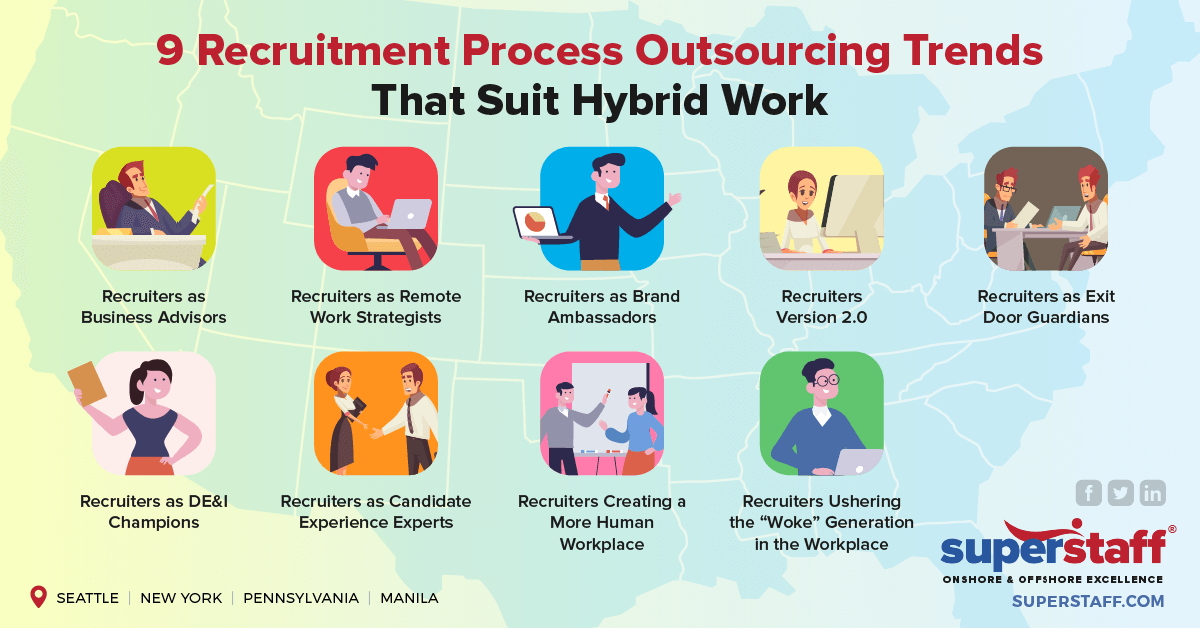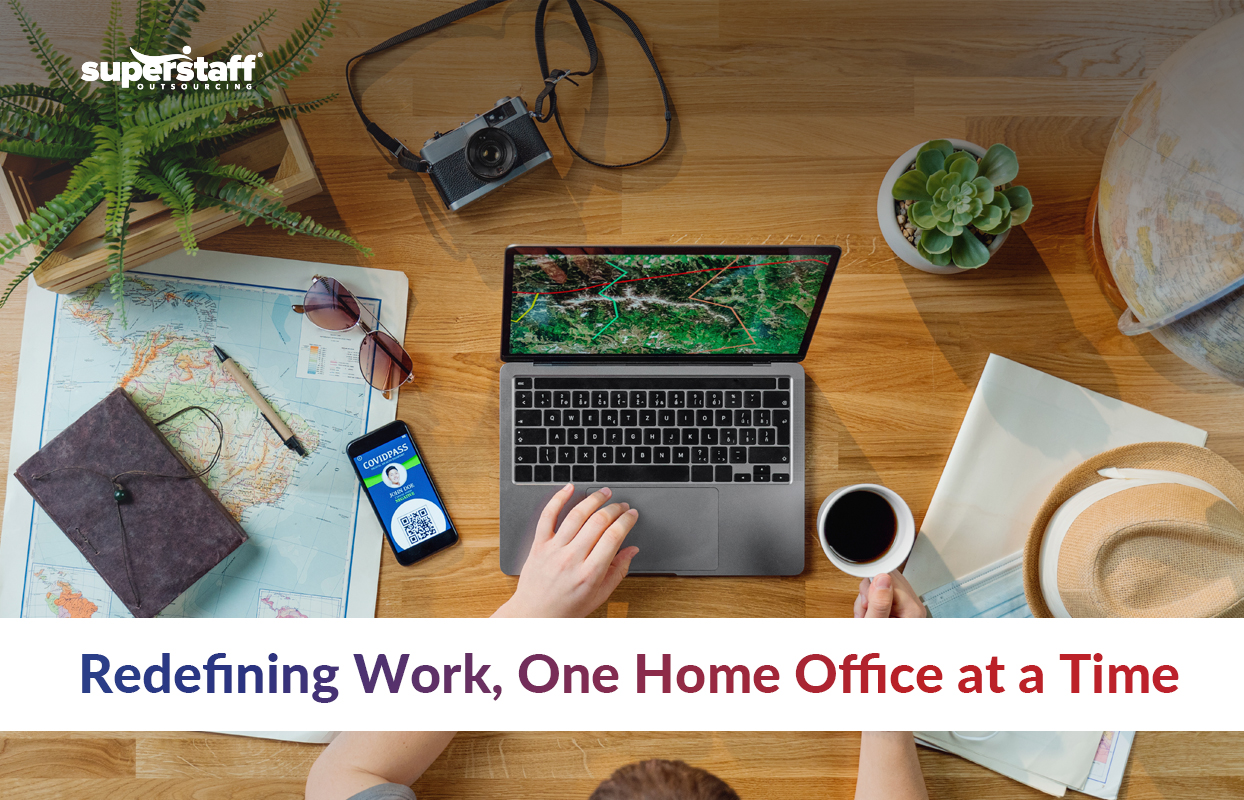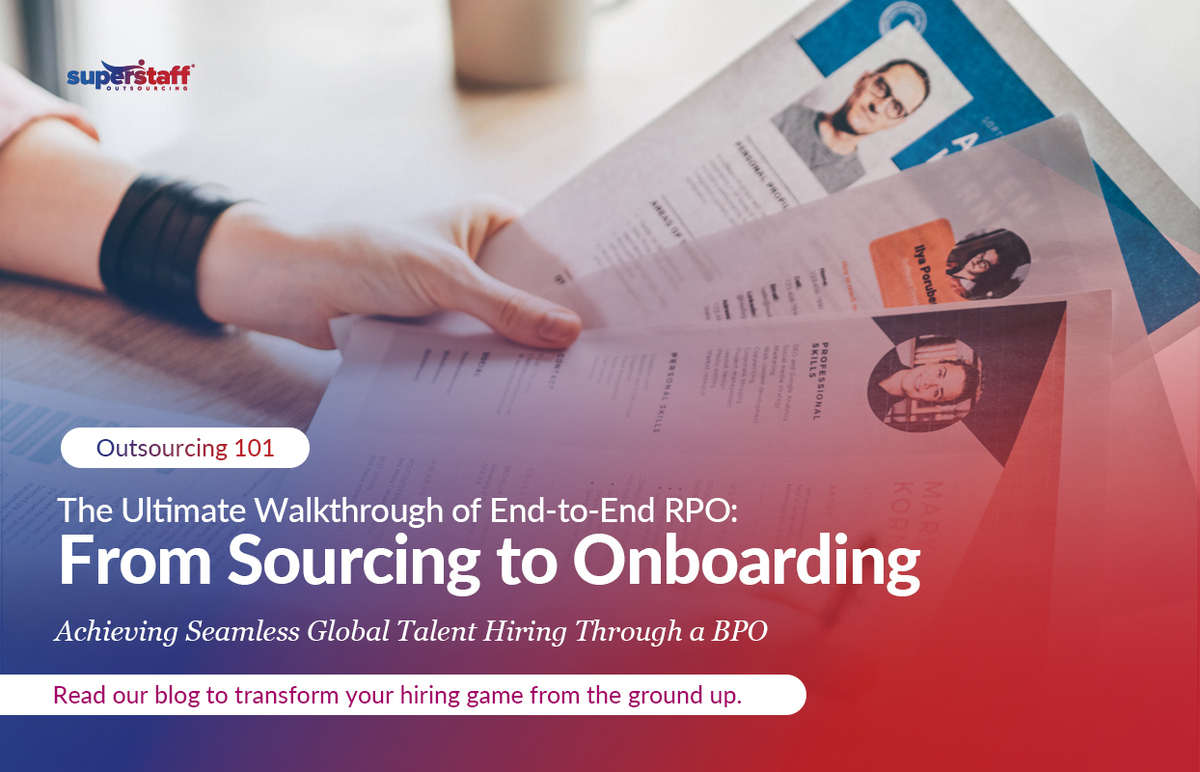
In 2020, the global workforce entered the ‘Great Remote Work Experiment.’ A year and a half later, another trend is altering normal as we know it: hybrid work. Let’s dig into this concept and the role of recruitment process outsourcing in this model.
Hybrid Work: A No One-Size-Fits-All Approach
Employers want to return to the office. Employees don’t. About 65% want to continue working remotely—and about 55% plan to resign instead of reporting physically to work.
This point is where the middle ground comes in: The hybrid work arrangement.
As the term implies, hybrid work employs a combination of more than one model: remote and in-office. The setup, frequency, and ratio may look different for every organization, but this basic principle applies.
4 Types of Hybrid Work Arrangements and Their Pros and Cons
Let’s take a look at the different types of hybrid work models that employers explore.
#1 – The Office-Centric Hybrid Work Model
Business as Usual With a Twist
In this model, employees are required to show up to the office on most days of the week but have some days, typically a couple of days, to work remotely. The majority of the employees, including the leadership, may also work in-office exclusively.
While this model allows the employees to work from home, they get to set the days the employers can work remotely and offer little flexibility to their work schedule.
Some companies that embrace the office-centric hybrid approach believe that the setup is still ideal for promoting employee collaboration and engagement.
Con: Driving Employees Back to the Office Is Not Easy
Considering the data mentioned above, employers that lean toward an office-centric hybrid model face risks of attrition. Employees who feel less autonomy and flexibility at the workplace are more likely to resign, even without job replacements in sight.
Even now, enterprises all over the world are experiencing the impact of The Great Attrition. A survey conducted by McKinsey in April 2021 showed that:
- 53% of employers experienced greater voluntary attrition compared to previous years
- 64% projected the issue to worsen over the next six months
- 40% of employees said they were somewhat likely to leave over the next 3-6 months
#2 – The Fully Flexible Hybrid Work Model
Whichever works best for you
The fully flexible hybrid model empowers employees to choose the setup that works best for them. They get to decide whether they want to work fully remote, office-based, or hybrid.
If they prefer to work hybrid, the employees can decide on the frequency, and specific days they will allot for office-based work. In most cases, they get to set their working schedule, too.
It’s not always rainbows and butterflies, though
Although this setup is more employee-centric, it also has downsides for the workers. The most common of which is the issue of inequality. Employees who prefer to work remotely full-time, or most of the time, may feel deprived of growth opportunities. They worry that the leadership may prioritize those with frequent face-to-face interactions when promotions open.
Combating Proximity Bias Must Be Intentional
To address this, leaders need to involve remote workers in meetings intentionally. It also helps to have another leader dedicated to remote teams to look out for remote workers’ interests and keep them accountable at the same time. Additionally, to ensure promotion based on merit, companies should have standardized key performance metrics.
#3 – The Office-Occasional Hybrid Work Model
Flexibility with a boundary
This model shares some semblance with the fully flexible hybrid work arrangement. The employers maintain an office for solo work and collaboration, and at the same time, keep a remote operation. This model is also called “remote-ish” or “remote-friendly.”
In this arrangement, employees choose the ideal type of setup for them but within the options provided by the employer. For example, employees may set their remote work days but not on Mondays and Fridays. The employer may also set a percentage of employees allowed to work from home during a specific period.
Although the office-occasional hybrid work arrangement gives both employers and employees control, it faces similar challenges to office-centered and fully flexible models.
#4 – The Remote-First Hybrid Work Model
Your work > where you work
Opposite of the office-first model, the remote-first model is more centered on virtual work. The setting puts more premium on the quality of the employee’s output over other metrics, such as productive hours.
Although the employer maintains an office, it is mainly used for occasional face-to-face collaboration meetings or events or for functions that are best (or can only be) carried out in the office.
Most companies see this as the ideal model as it presents the most win-win solutions for both the employer and the employees.
A more level playing field
Since the default arrangement is remote for everyone, it resolves proximity bias. At the same time, employees save time and money on the commute and enjoy other tangible benefits of a flexible hybrid work model.
What’s in it for employers?
On the other hand, employers get to save more since lesser office footprints mean less overhead expenses and carbon footprints. On average, companies save $11,000 per part-time telecommute annually.
But, perhaps, the most attractive benefits that remote-first employers get is enhanced employee productivity and performance. According to the data collected by Forbes:
- Remote workers are about 35-45% more productive than office-based workers.
- They also show 41% lower absenteeism.
- Remote employees also produce output with 40% lower defects.
9 Hiring Trends That Address Hybrid Work Challenges and How Recruitment Process Outsourcing Can Help Businesses
There is no perfect work setup. But being intentional in addressing the known pitfalls of hybrid work—as early as the recruitment stage—can help companies achieve an ideal arrangement.
Here are some of the hiring trends that address the challenges of hybrid work and how RPO solutions can enhance your talent acquisition strategies.
# 1 – Recruiters as Business Advisors
The hybrid work model is a new concept for many businesses. On the other hand, RPO solutions providers are no stranger to conducting recruitment on such a setup. Many have been helping global organizations enhance virtual workforces, particularly those that employ offshore outsourcing strategies.
Recruitment outsourcing professionals are versed with the trends and shifts in the labor and workforce market. Working with global organizations and candidates, RPO solutions experts offer insights that employers may not be able to access anywhere else, such as first-hand candidate feedback and anecdotes.
#2- Recruiters as Remote Work Strategists
Much of the Great Attrition issues point to employers being clueless to what most employees—whether remote, office-based, or hybrid—want from employers. Many blindly transitioned to remote or hybrid work, out of necessity, without enough workforce planning.
As a result, the remote or hybrid work arrangement issues mentioned earlier were not taken into consideration. Recruiters may also overlook other conflicts such as fair compensation and a balanced demographic ratio.
RPO solutions providers can help employers pivot and shift priorities to address these issues with new insights, skills, and strategies.
#3 – Recruiters as Brand Ambassadors
The pandemic gave birth to many new concepts in the business and recruitment arenas, including The Great Attrition and The Great Rehire. Combine these two, and the result is an all-out war for top talents, giving companies more reasons to enhance employer branding. According to a study by LinkedIn:
- Candidates under 40 years old are 61% more likely to consider a job based on employer branding.
- Candidates outside the US are 37% more likely to consider a job based on employer branding.
- Employer brand is three times more likely to encourage or discourage individual contributors and managers from considering a job offer.
Stories are a powerful employer branding arsenal. Employees want to know who you are, what you believe in, and your culture and vision. Recruitment outsourcing professionals know how to devise strategies to tell your stories on the right platform and to the right audience. They also know how to navigate the extremely noisy digital world and position their content on the ideal channels.
#4 – Recruiters Version 2.0
When the pandemic first struck in 2020, recruitment process outsourcing professionals used their downtimes to expand their skill sets, adding new normal recruitment skills and strategies under their belts. According to a study conducted by LinkedIn, the following are the top three fastest-growing skills among recruiters in 2020:
- Personal development (44% increase)
- Diversity and inclusion (42% increase)
- Talent pipelining (37% increase)
RPO solutions experts facilitate skill testing, video interviews, personality tests, and psychometric evaluation to address the challenges of conducting remote candidate screening. They also use artificial intelligence to reduce the time to hire.
Compared to traditional hiring methods, these techniques are more immersive. Recruitment outsourcing leaders utilize them to illuminate skills and traits that a CV can not reflect, such as whether the candidate can perform actual tasks and how well they respond to real-life scenarios.
Recruitment process outsourcing provides employers with the shortest route to recruiters with future-ready skills, eliminating the need to invest in upskilling and reskilling in-house recruiters.
#5 – Recruiters as Exit Door Guardians
Employee turnover has always been costly. But amid COVID-19 and the intensified skill shortage, it hurts businesses now more than ever. On average, talent exits cost businesses 33% of an employee’s annual salary. If an employee’s median wage is $45,000, the average turnover cost is $15,000 per year.
Starting on the Right Foot: How Outsourcing Recruitment Optimizes Employee Retention
- Conduct rigorous skill tests. Understanding that having the right skill fit directly impacts the lifespan of an employee in the company, recruitment outsourcing experts facilitate applicant screening measures, both for technical and soft skills. They also use predictive analytics to gauge performance and success.
- Elevate the onboarding experience. Great employee onboarding improves the new hire retention rate by 82%. An RPO solutions partner can lay a solid foundation to set the candidates up for success as they progress with their careers in the company.
- Gain valuable insights for reskilling and upskilling strategies. With a birds-eye view of the employees’ profiles, recruitment process outsourcing providers can uncover skill gaps and advise suitable approaches to address them.
- Elevate candidate relationship management. Recruitment outsourcing experts know how to keep potential, new, and existing talents engaged.
#6 – Recruiters as DE&I Champions
DE&I. These three letters have a powerful impact on every organization. Consumers and stakeholders continue to pressure companies to elevate their efforts to build a diverse, equitable, and inclusive organization. And employees are after the same.
According to the Manifest, 70% of job seekers want to work for a company that pushes diversity and inclusion. As such, demonstrating a solid commitment to diversity, equity, and inclusion must be a substantial part of every employer’s branding strategy.
How Outsourcing Recruitment Champions DE&I
- Root out biases. RPO solutions experts utilize CV blinding, skill tests, and other strategies to eliminate conscious and unconscious biases.
- Recruit from new geographies. Recruitment process outsourcing expands the employer’s talent acquisition reach to a global level.
- Strategize based on demographic data. With access to data-driven insights, recruitment outsourcing providers can devise quantifiable and measurable solutions to help employers achieve an ideal demographic ratio.
#7 – Recruiters as Candidate Experience Experts
In a world of stiff talent competition, candidate experience sets brands apart. As candidates’ first point of contact, recruiters set the stage for how the candidate will forge a relationship with the brand. A candidate experience study conducted by IBM showed that:
- Candidates who had a positive experience are 38% more likely to accept a job offer.
- Candidates who did not receive a job offer are 80% more likely to reapply after a company’s positive experience.
- 48% of job seekers had previous interactions with a company before application.
How RPO Solutions Impact Your Brand’s CRM
- Recruitment process outsourcers utilize proactive strategies to capture potential candidates’ interests.
- Design an ideal candidate experience journey. Relying on proven methodologies, recruitment outsourcing firms can create a seamless journey to elevate the candidate’s experience across various touchpoints.
- Increase tech proficiency. RPO solutions providers use modern recruitment CRM software to streamline the engagement of active and passive candidates.
#8 – Recruiters Creating a More Human Workplace
As the workplace becomes increasingly digitally reliant, it is ironic that there is also a call for it to become more human. Emotional intelligence, communication, adaptability, and other soft skills have become among the in-demand skills in the labor market.
According to Wonderlic, 93% of hiring leaders consider soft skills an “essential” or “very important” hiring decision factor. Even technical and analytic industries, such as IT, list more than a quarter of soft skills in their hiring requirements.
But soft skills are not only hard to assess during hiring; they are increasingly becoming rare as well. According to the US Department of Labor: “A large percentage of young people preparing to enter the workforce over the next two decades are significantly lacking in soft skills such as teamwork, decision making, and communication.”
Indispensable Recruitment Process Outsourcing Benefits
Fortunately, there are tools that recruiters use to help assess how a candidate’s emotional intelligence will fare under stressful conditions, during conflicts, and when faced with other challenges in the workplace. These include facilitating psychometric and personality tests and asking situational interview questions.
These tools, however, serve as an aid for the recruiter and not be solely relied upon for gauging a candidate’s soft skills. Ultimately, the success lies in the recruiter’s expertise and experience, something that RPO solutions providers have long been bringing to the table.
#9 – Recruiters Ushering the “Woke” Generation in the Workplace
Gen-Zs are the workforce of the future. They are young, digital natives, competitive, collaborative, and adaptable. By 2025, “dot.com natives” will comprise 27% of the global workforce. Employers need to optimize their talent acquisition strategies to tap the current Gen Z talents and make room for the impending arrival of more Gen-Zs in the workplace.
How Recruitment Process Outsourcing Helps Employers Attract Top Gen-Z Talents
- Be where they are. 74% of Gen Zs spend their free time online. An RPO solutions provider with multichannel capabilities brings employers closer to where Gen Z’s hangout, from Instagram to Snapchat.
- Showcase your values. Living up to their roles as brand ambassadors, recruitment outsourcing professionals can promote your social, political, or environmental initiatives. An RPO solutions partner can also maintain your reputation online on employee review platforms like Glassdoor and Yelp.
- Keep things simple. A faster-to-complete application form can increase job applications from mobile job seekers by 2.3%. Outsourcing recruitment enables employers to provide a seamless candidate experience effortlessly.
- Flex tech prowess. 26% of Gen-Z job seekers will reconsider working for a company if no technology is involved in the hiring process. Getting plugged into the latest intelligent software is among the effective recruitment processes outsourcing benefits employers should leverage.
Develop a Hybrid Work-Friendly Hiring Strategy With SuperStaff
SuperStaff is ready to gear you up for success as you join the great shift to hybrid work. Contact us to learn more about recruitment process outsourcing services.






